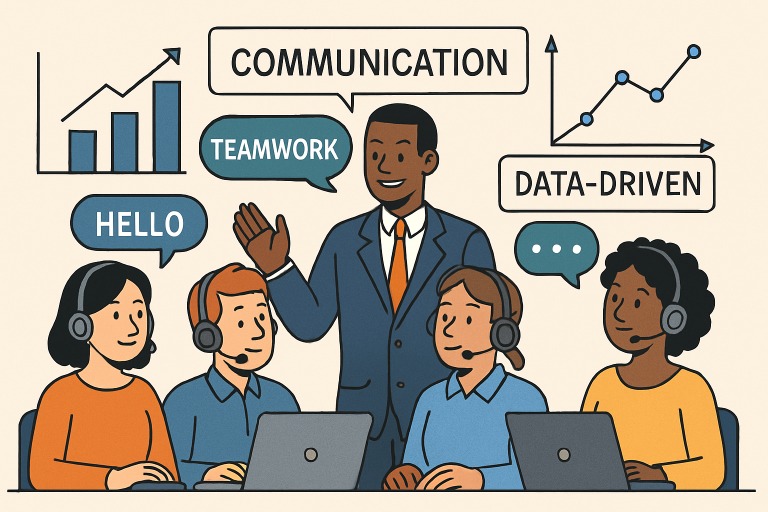The Essentials of a Modern Call Center Manager
Call center managers must balance operational skills, tech fluency, and people management to succeed in today’s customer-focused landscape. They must create seamless workflows and clear communication to improve customer experience and business outcomes. Adaptability is crucial with remote and hybrid work, fostering connectivity and collaboration among teams while maintaining service quality. Leaders must adapt to evolving customer needs and industry standards, building a culture of trust and resilience for sustainable success.
Communication and Leadership in Customer Service
Clear, empathetic communication is vital in customer service. Managers fostering transparency and open dialogue build loyal, motivated teams willing to go the extra mile. Skilled managers develop their team, resolve conflicts, recognize achievements, and tailor coaching to individual strengths. Active listening ensures agents feel heard, reducing turnover and boosting morale. By implementing effective retention call center strategies, leaders can promote psychological safety, encouraging teams to share challenges and solutions, ultimately increasing satisfaction and resolution rates.
Empathy: The Secret to Leading High-Performing Teams
Empathy, often overlooked, is a crucial leadership skill in call centers. Managers who genuinely concern themselves with agents well-being see benefits like less burnout, lower attrition, and higher performance. Understanding each agent’s perspectives—through check-ins, celebrating contributions, or offering flexible support—fosters trust and engagement. Empathetic leaders address issues early, boosting morale and making agents feel valued beyond their job roles. This builds trust and loyalty, benefiting both employees and the organization. Managers’ empathy is key to agent welfare, customer retention, and satisfaction in a demanding world.
Data-Driven Decision Making
Data fluency distinguishes proactive managers from reactive ones. Call center leaders must analyze KPIs like first-call resolution, customer feedback, call volume, handle times, agent occupancy, and service levels. Mastering analytics tools optimizes workflow and reveals improvement opportunities. Effective managers quickly spot negative trends and intervene—by adjusting training or workloads—for better efficiency. Organizations prioritizing analytics outperform in customer experience and efficiency. Data-driven decisions enable managers to foster continuous improvement, cut costs, and boost organizational agility.
Training and Professional Growth for Managers
The demand for exceptional service is rising, and professional development is now essential. Companies invest in call center managers through programs on crisis management, conflict resolution, people development, and digital transformation, with workshops, e-learning, or simulations. Mentorship and networking help managers stay current with trends. Continuous learning and support foster resilience and innovation. Managers promoting growth for themselves and staff build adaptable, engaged teams that thrive in changing markets. This growth mindset strengthens leadership pipelines and supports succession planning in a competitive industry.
Tech Adoption: Staying Ahead in Customer Support
In the fast-paced tech landscape, customer service managers must remain knowledgeable and flexible to enhance efficiency and customer satisfaction. They should lead tech adoption, promote ongoing training, and ensure new tools improve the customer experience. Effective tech integration aligns processes, people, and platforms, enabling agents to work smarter and offer personalized support. Leading managers go beyond traditional KPIs by holding regular review sessions, tracking engagement, coaching, and customer value, and aligning performance metrics with mission and values, fostering accountability and shared purpose.
Preparing for the Future: Evolving Expectations in the Industry
The future of call center management requires balancing technological skills and emotional intelligence. As contact centers evolve into multi-channel hubs, successful leaders are proactive, blend soft skills with digital literacy, and build strong connections with teams and customers. They stay updated on best practices, invest in personal growth, and promote this mindset among staff. Listening to customer needs and adapting strategies as circumstances change will define future industry leaders. Embracing these changes will keep call centers agile, efficient, and customer-focused.
Conclusion
Modern call center management requires a balance of operational expertise, technological proficiency, and emotional intelligence. Leaders who prioritize clear communication, empathy, and data-driven decision-making cultivate high-performing teams, enhance customer satisfaction, and foster a culture of trust. Effective retention strategies and aligning team goals with customer needs drive sustainable success and maintain a competitive edge.



